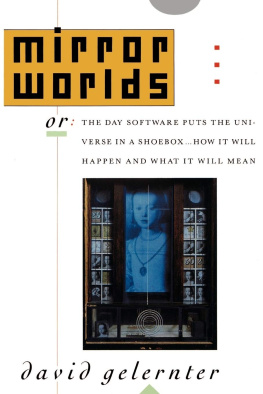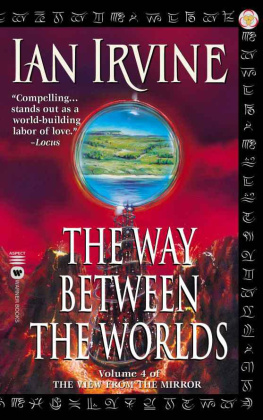David Gelernter - Mirror Worlds : Or the Day Software Puts the Universe in a Shoebox ... How It Will Happen and What It Will Mean
Here you can read online David Gelernter - Mirror Worlds : Or the Day Software Puts the Universe in a Shoebox ... How It Will Happen and What It Will Mean full text of the book (entire story) in english for free. Download pdf and epub, get meaning, cover and reviews about this ebook. City: Oxford, year: 1992, publisher: Oxford University Press, genre: Science. Description of the work, (preface) as well as reviews are available. Best literature library LitArk.com created for fans of good reading and offers a wide selection of genres:
Romance novel
Science fiction
Adventure
Detective
Science
History
Home and family
Prose
Art
Politics
Computer
Non-fiction
Religion
Business
Children
Humor
Choose a favorite category and find really read worthwhile books. Enjoy immersion in the world of imagination, feel the emotions of the characters or learn something new for yourself, make an fascinating discovery.
- Book:Mirror Worlds : Or the Day Software Puts the Universe in a Shoebox ... How It Will Happen and What It Will Mean
- Author:
- Publisher:Oxford University Press
- Genre:
- Year:1992
- City:Oxford
- Rating:3 / 5
- Favourites:Add to favourites
- Your mark:
Mirror Worlds : Or the Day Software Puts the Universe in a Shoebox ... How It Will Happen and What It Will Mean: summary, description and annotation
We offer to read an annotation, description, summary or preface (depends on what the author of the book "Mirror Worlds : Or the Day Software Puts the Universe in a Shoebox ... How It Will Happen and What It Will Mean" wrote himself). If you haven't found the necessary information about the book — write in the comments, we will try to find it.
Technology doesnt flow smoothly; its the big surprises that matter, and Yale computer expert David Gelernter sees one such giant leap right on the horizon. Todays small scale software programs are about to be joined by vast public software works that will revolutionize computing and transform society as a whole. One such vast program is the Mirror World.
Imagine looking at your computer screen and seeing reality--an image of your city, for instance, complete with moving traffic patterns, or a picture that sketches the state of an entire far-flung corporation at this second. These representations are called Mirror Worlds, and according to Gelernter they will soon be available to everyone. Mirror Worlds are high-tech voodoo dolls: by interacting with the images, you interact with reality. Indeed, Mirror Worlds will revolutionize the use of computers, transforming them from (mere) handy tools to crystal balls which will allow us to see the world more vividly and see into it more deeply. Reality will be replaced gradually, piece-by-piece, by a software imitation; we will live inside the imitation; and the surprising thing isthis will be a great humanistic advance. We gain control over our world, plus a huge new measure of insight and vision.
In this fascinating bookpart speculation, part explanationGelernter takes us on a tour of the computer technology of the near future. Mirror Worlds, he contends, will allow us to explore the world in unprecedented depth and detail without ever changing out of our pajamas. A hospital administrator might wander through an entire medical complex via a desktop computer. Any citizen might explore the performance of the local schools, chat electronically with teachers and other Mirror World visitors, plant software agents to report back on interesting topics; decide to run for the local school board, hire a campaign manager, and conduct the better part of the campaign itselfall by interacting with the Mirror World.
Gelernter doesnt just speculate about how this amazing new software will be usedhe shows us how it will be made, explaining carefully and in detail how to build a Mirror World using technology already available. We learn about disembodied machines, trellises, ensembles, and other computer components which sound obscure, but which Gelernter explains using familiar metaphors and terms. (He tells us that a Mirror World is a microcosm just like a Japanese garden or a Gothic cathedral, and that a computer program is translated by the computer in the same way a symphony is translated by a violinist into music.) Mirror Worlds offers a lucid and humanistic account of the coming software revolution, told by a computer scientist at the cutting edge of his field.
This is a fascinating book, and important from the point of view of thinking about the future of software. Its also very easy to read, being written in a conversational style, not American academic jargon. The Guardian
most unusual and perhaps most speculative Clifford A. Pickover, Nature
David Gelernter is Associate Professor of Computer Science at Yale University and an expert in programming languages and methods, and in artificial intelligence.
David Gelernter: author's other books
Who wrote Mirror Worlds : Or the Day Software Puts the Universe in a Shoebox ... How It Will Happen and What It Will Mean? Find out the surname, the name of the author of the book and a list of all author's works by series.












